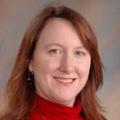Sallie W. Smith–Schneider

Scientist, Pioneer Valley Life Sciences Institute
Adjunct Research Assistant Professor of Veterinary and Animal Sciences, University of Massachusetts
Ph.D.: University of Massachusetts, Amherst Postdoctoral Training: Harvard Medical School
Research Interests
Development of the mature mammary gland requires numerous signaling pathways engaged by secreted factors and cell:cell interactions. My overall interest is in studying the signaling pathways that control normal and abnormal development in the mammary gland, as well as the role of communication between various cellular compartments in these processes. In the past few years we have focused on the role of Notch receptor proteins during normal and abnormal development. The Notch family of proteins is comprised of four extracellular membrane-associated receptors (Notch 1-4) whose structure and function have been highly conserved throughout evolution. Signaling through these receptors is initiated by ligand on adjacent cells, which results in activation through proteolytic cleavage events at the membrane. The cytoplasmic domain is released and translocates to the nucleus where it participates in numerous protein:protein interactions which affect transcription. Transgenic studies have indicated that deregulated expression of the Notch4 receptor results in a retarded growth of the epithelial cell compartment of the mammary gland and a block in lobulo-alveolar development. Furthermore, these mice develop breast tumors within three to six months. My lab has been studying signaling pathways induced by Notch receptors and how these pathways interact with a number of other signaling pathways involved in mammary gland development. I am particularly interested in the interplay between Notch signaling and steroid receptor transactivation, p53 activation, and activation of growth factor signaling (i.e. EGF and TGF?). As a member of the Baystate/UMASS Research Institute, I will be presented with a unique and exciting opportunity to move my research in a more translational direction.